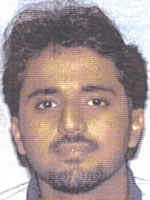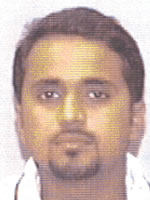|
|
|
Adnan G. el Shukrijumah, al Qaeda’s operations chief for North America. Photos from the Rewards for Justice website. |
The terrorists who plotted to blow up New York City subways last year may have met with a top al Qaeda operative who has been wanted by the US since 2003, according to multiple press accounts.
The subway plot was headed by Najibullah Zazi, an Afghan citizen and US resident, who pled guilty to terrorism-related charges earlier this year. According to press accounts, either Zazi or his coconspirators met with an elusive al Qaeda operative named Adnan Shukrijumah. Prior to the September 11, 2001, terrorist attacks, Shukrijumah lived in Florida and had been groomed by senior al Qaeda leaders, including September 11 mastermind Khalid Sheikh Mohammed (KSM), to be a sleeper agent responsible for launching a new round of attacks inside the US.
According to the Associated Press, three of the subway plotters traveled to Pakistan where they may have met with Shukrijumah. Two of the three attempted to join the Taliban’s forces in Afghanistan, but were turned away by suspicious Pakistani police at the border. All three of the plotters then regrouped in Pakistan, where they were recruited by senior al Qaeda leaders to perform a suicide operation in the US.
Salah al Somali, who was the head of al Qaeda’s external operations at the time (al Somali was subsequently killed in a Predator strike in North Waziristan, Pakistan, in December 2009), and Rashid Rauf, a member of Jaish-e-Mohammed who is suspected of playing a role in al Qaeda’s 2006 plot against British airliners, reportedly recruited the men for al Qaeda. It was after the subway plotters were recruited by al Somali and Rauf that they met with Shukrijumah.
Zazi himself may have met with Shukrijumah, according to the New York Daily News.
Shukrijumah is thought to be one of al Qaeda’s top leaders in its external, or global, operations network. Shukrijumah is al Qaeda’s operations chief for North America, US intelligence officials have told The Long War Journal. Officials told The Associated Press that Shukrijumah is a top contender to lead al Qaeda’s global operations.
The “next” Mohammed Atta
Since 2003, Shukrijumah has been one of the most wanted al Qaeda terrorists in the world. On March 20, 2003, the FBI released a “Be on the Lookout” alert for Shukrijumah (aka Jafar al Tayyar, or Jafar “the Pilot”). In the days that followed, press outlets reported some of the details on el Shukrijumah’s suspicious career.
Shukrijumah had lived in the US for years and attended a mosque in Florida where he mixed with radicals. At some point, Shukrijumah traveled to Afghanistan where he allegedly received training in al Qaeda’s camps and was groomed by senior al Qaeda leaders for future missions. In 2003, FBI and US intelligence officials told the press that Shukrijumah then came back to the US with a particularly lethal purpose: to coordinate terrorist attacks on American soil after September 11, 2001.
Just days after the FBI’s alert was issued, CBS News (“Most Wanted: The Next Atta?”) and U.S. News & World Report (“A Hunt for ‘The Pilot'”) published accounts explaining how Shukrijumah was identified. The press outlets reported that the interrogation of KSM, who had been captured just weeks earlier, played an instrumental role. That interrogation would subsequently become controversial after it was revealed that certain “enhanced interrogation techniques,” including waterboarding, were used.
The release last year of the CIA Inspector General’s Report on the enhanced interrogation program and two other CIA analytical documents, as well as a summary prepared by the Office of the Director of National Intelligence, confirm the details set forth in those two early press accounts.
The story of the intelligence that led to the FBI’s alert, according to all of these sources, is as follows.
In May 2002, US authorities began asking al Qaeda detainees an urgent question. According to U.S. News, the officials wanted to know: “Whom would al Qaeda pick to lead the next big attack against U.S. targets?” Abu Zubaydah, who was captured in the early hours of March 28, 2002, fingered an al Qaeda-trained terrorist who Zubaydah knew by the nom de guerre Jafar al Tayyar. Other detainees fingered Jafar as well, but Zubaydah was the first.
According to a June 3, 2005, CIA analysis titled “Detainee Reporting Pivotal for the War Against Al Qaeda,” Jafar al Tayyar “first came to the FBI’s attention when Abu Zubaydah named him as one of the most likely individuals to be used by al Qaeda for operations in the United States or Europe.” (A document released by the Office of the Director of National Intelligence contained the same detail about Zubaydah’s role.)
“Several detainees identified a man who looked like el Shukrijumah,” U.S. News reported, but it was the wrong suspect. It wasn’t until KSM was captured on March 1, 2003, and then interrogated, that investigators got a real break. Here is how U.S. News reported it:
Two weeks ago [in early March 2003], the search turned up a new name–and a new photograph. But investigators still were not sure. The crucial moment didn’t come until Khalid Shaikh Mohammad corroborated the investigators’ hunch. El Shukrijumah, he said after being shown a photograph, was Jafar the Pilot.
A CIA analysis dated July 13, 2004, and titled “Khalid Sheikh Mohammed: Preeminent Source on Al Qaeda” includes this corroborating detail: “KSM has also spoken at length about operative Jafar al Tayyar, admitting that al Qaeda had tasked al Tayyar to case specific targets in New York City in 2001.”
Recent press reports dealing with Shukrijumah’s ties to the New York City subway plot do not mention whether the al Qaeda terrorist briefed Zazi or his cohorts on specific targets. But it is certainly possible that Shukrijumah himself had cased the subways as early as 2001. Al Qaeda also typically maintains surveillance files on targets that have been cased and it is possible that such information was shared with the NYC subway plotters.
The identification of Shukrijumah as Jafar the Pilot led to a massive manhunt, with widespread media coverage. It may be the case that this scrutiny is what prevented Shukrijumah from carrying out al Qaeda’s bidding in 2003. Some press accounts have suggested that Shukrijumah may have even cased American nuclear facilities or investigated attacks involving radiological material. Such reports may exaggerate Shukrijumah’s intentions. At a minimum, however, Shukrijumah cased targets for future attacks and planned to coordinate those attacks with other al Qaeda operatives.
In March 2003, Pat d’Amuro, who was then a top FBI counterterrorism official, explained: “We believe that the targets that he would be affiliated with, domestically, here in the United States, could be fuel tankers, apartment buildings, transportation hubs.”
D’Amuro further warned: “This individual would rate in the top five with respect to protection of the homeland… I would say, for domestic reasons, within the continental United States, this individual is very important for the FBI to find.”
If recent press accounts are correct, Shukrijumah is in northern Pakistan and is still plotting attacks against the continental US on behalf of al Qaeda.









